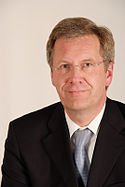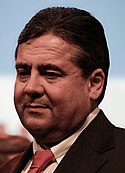
Germany is a democratic and federal parliamentary republic, where federal legislative power is vested in the Bundestag and the Bundesrat.

Christian Wilhelm Walter Wulff is a retired German politician and lawyer who served as President of Germany from 2010 to 2012. A member of the Christian Democratic Union (CDU), he previously served as minister president of the state of Lower Saxony from 2003 to 2010. He was elected to the presidency in the 30 June 2010 presidential election, defeating opposition candidate Joachim Gauck and taking office immediately, although he was not sworn in until 2 July. With the age of 51, he became Germany's youngest president.
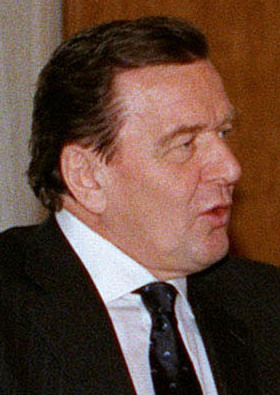
Federal elections were held in Germany on 27 September 1998 to elect the members of the 14th Bundestag. The Social Democratic Party (SPD) emerged as the largest faction in parliament for the first time since 1972, with its leader Gerhard Schröder becoming chancellor. The Christian Democrats had their worst election result since 1949.

The 2004 Saxony state election was held on 19 September 2004 to elect the members of the 4th Landtag of Saxony. The incumbent Christian Democratic Union (CDU) government led by Minister-President Georg Milbradt lost its majority. The CDU subsequently formed a grand coalition with the Social Democratic Party (SPD), and Milbradt was re-elected as Minister-President.
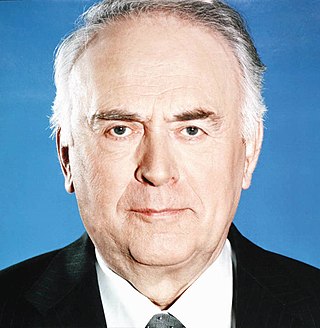
The 2002 Saxony-Anhalt state election was held on 21 April 2002 to elect the members of the 4th Landtag of Saxony-Anhalt. The incumbent Social Democratic Party (SPD) minority government led by Minister-President Reinhard Höppner was defeated. The SPD fell to third place, while the Christian Democratic Union (CDU) moved into first. The CDU subsequently formed a coalition with the Free Democratic Party (FDP), and CDU leader Wolfgang Böhmer was elected Minister-President.

The 2005 North Rhine-Westphalia state election was held on 22 May 2005 to elect the 14th Landtag of North Rhine-Westphalia. The outgoing government was a coalition of the Social Democratic Party (SPD) and The Greens led by Minister-President Peer Steinbrück.

David James McAllister is a German politician who has been a member of the European Parliament since 2014. He is a member of the Christian Democratic Union, part of the European People's Party. He is the current vice president of the European People's Party and he is also vice chairman of the International Democrat Union. He was appointed Chair of the European Parliament Foreign Affairs Committee in February 2017.

The 2008 Lower Saxony state election was held on 27 January 2008 to elect the members of the 16th Landtag of Lower Saxony. The incumbent coalition government of the Christian Democratic Union (CDU) and Free Democratic Party (FDP) led by Minister-President Christian Wulff was re-elected with a reduced majority.

The Lower Saxon Landtag or the Parliament of Lower Saxony is the state diet of the German state of Lower Saxony. It convenes in Hanover and currently consists of 146 members, consisting of four parties. Since 2022 the majority is a coalition of the Social Democratic Party and the Greens, supporting the cabinet of Minister-President Stephan Weil (SPD).

The 2013 Lower Saxony state election was held on 20 January 2013 to elect the members of the 17th Landtag of Lower Saxony. The incumbent coalition government of the Christian Democratic Union (CDU) and Free Democratic Party (FDP) led by Minister-President David McAllister was defeated. The Social Democratic Party (SPD) formed a government with The Greens which held a slim, one-seat majority. Stephan Weil was subsequently elected Minister-President.

Stephan Weil is a German politician and the leader of the Social Democratic Party in Lower Saxony. On 20 January 2013, the SPD and the Green party won the 2013 Lower Saxony state election by one seat. On 19 February 2013, he was elected Minister President of Lower Saxony with the votes of SPD and Alliance '90/The Greens. From 1 November 2013 until 31 October 2014 he was President of the Bundesrat and ex officio deputy to the President of Germany. In November 2017, he was again elected Minister President with the votes of SPD and CDU.

The 2014 Saxony state election was held on 31 August 2014 to elect the members of the 6th Landtag of Saxony. The incumbent coalition government of the Christian Democratic Union (CDU) and Free Democratic Party (FDP) led by Minister-President Stanislaw Tillich was defeated as the FDP lost all its seats. The CDU subsequently formed a grand coalition with the Social Democratic Party (SPD), and Tillich was re-elected as Minister-President.

The 2016 Saxony-Anhalt state election was held on 13 March 2016 to elect the members of the 7th Landtag of Saxony-Anhalt. The incumbent grand coalition of the Christian Democratic Union (CDU) and Social Democratic Party (SPD) led by Minister-President Reiner Haseloff lost its majority. The Alternative for Germany (AfD) debuted at 24.3%, with every other parliamentary party recording losses, particularly the SPD and The Left.

The 2017 Lower Saxony state election was held on 15 October 2017 to elect the 18th Landtag of Lower Saxony. The incumbent coalition government of the Social Democratic Party (SPD) and The Greens led by Minister-President Stephan Weil was defeated. Though the SPD became the largest party in the Landtag largely fueled by the personal popularity of Weil, their gains were offset by losses for the Greens, depriving the government of its majority. The SPD subsequently formed a grand coalition with the Christian Democratic Union (CDU), and Weil continued as Minister-President.
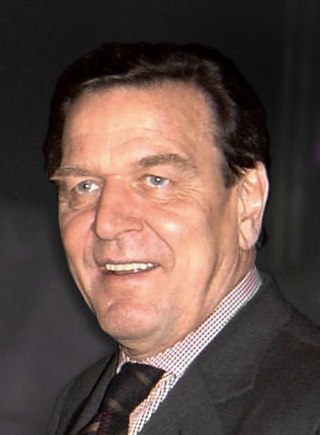
The 1990 Lower Saxony state election was held on 13 May 1990 to elect the members of the 12th Landtag of Lower Saxony. The incumbent coalition government of the Christian Democratic Union (CDU) and Free Democratic Party (FDP) led by Minister-President Ernst Albrecht was defeated. The Social Democratic Party (SPD) subsequently formed a coalition with The Greens, and SPD leader Gerhard Schröder was elected Minister-President.
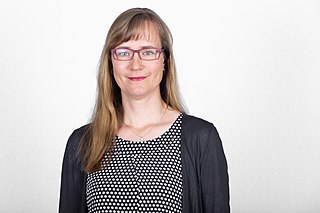
The 2021 Saxony-Anhalt state election was held on 6 June 2021 to elect the 8th Landtag of Saxony-Anhalt. The outgoing government was coalition of the Christian Democratic Union (CDU), Social Democratic Party (SPD), and The Greens, led by Minister-President Reiner Haseloff.

The 2022 Lower Saxony state election was held on 9 October 2022 to elect the 19th Landtag of Lower Saxony. The incumbent government was a coalition of the Social Democratic Party of Germany (SPD) and Christian Democratic Union of Germany (CDU) led by Minister-President Stephan Weil.

The Third Woidke cabinet was the state government of Brandenburg from 2019 to 2024. It was sworn in on 20 November 2019 after Dietmar Woidke was elected as Minister-President of Brandenburg by the members of the Landtag of Brandenburg. It was the 9th Cabinet of Brandenburg.

The second Weil cabinet was the state government of Lower Saxony between 2017 and 2022, sworn in on 22 November 2017 after Stephan Weil was elected as Minister-President of Lower Saxony by the members of the Landtag of Lower Saxony. It was the 29th Cabinet of Lower Saxony.

The 1966 North Rhine-Westphalia state election was held on 10 July 1966 to elect the 6th Landtag of North Rhine-Westphalia. The outgoing government was a coalition of the Christian Democratic Union (CDU) and Free Democratic Party (FDP) led by Minister-President Franz Meyers.

